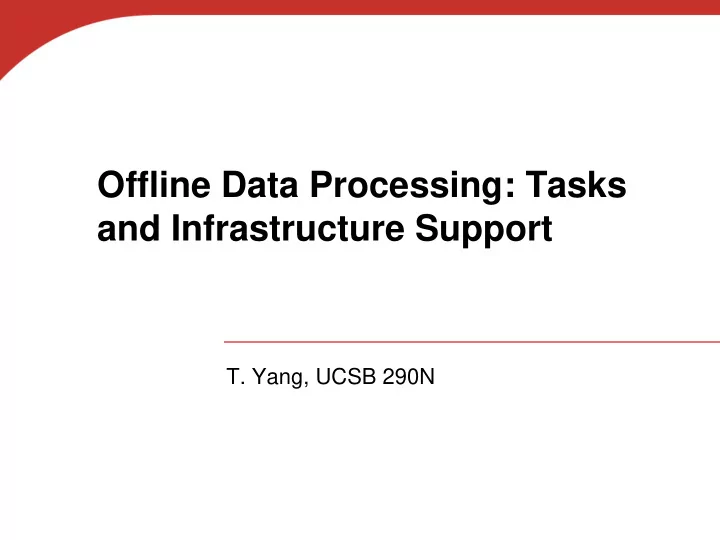

Offline Data Processing: Tasks and Infrastructure Support T. Yang, UCSB 290N
Table of Content • Offline incremental data processing: case study • Example of content analysis • System support
Offline Architecture for Ask.com Search
Content Management • Organize the vast amount of pages crawled to facilitate online search. Data preprocessing Inverted index Compression Classify and partition data • Collect additional content and ranking signals. Link, anchor text, log data • Extract and structure content • Duplicate detection
Classifying and Partitioning data English English English Main . UK Australia • Classify Content quality. Language/country etc • Partition Based on languages and countries. Geographical distribution based on data center locations Partition based on quality – First tier --- high chance that users will access Quality indicator Click feedback Tier 1 – Second tier – lower chance Tier 2
Examples of Context Extraction/Analysis • Identify key phrases that capture the meaning of this document. For example, title, section title, highlighted words. – HTML vs PDF • Identify parts of a document representing the meaning of this document. Many web pages contain a side-menu, which his less relevant to the main content of the documents • Capture page content through Javascript analysis. Page rendering and Javascript evaluation within a page
Example of Content Analysis • Detect content block related to the main content of a page Non-content text/link material is de-prioritized during indexing process
Redundant Content Removal in Search Engines • Over 1/3 of Web pages crawled are near duplicates • When to remove near duplicates? Offline removal Offline data Web Duplicate Online processing Pages filtering index Online removal with query-based duplicate removal Final results Online index Duplicate matching & User removal result ranking query
Why there are so many duplicates? • Same content, different URLs, often with different session IDs. • Crawling time difference
Tradeoff of online vs. offline removal Online-dominating Offline-dominating approach approach Impact to offline High precision High precision Low recall High recall Remove fewer Remove most of duplicates duplicates Higher offline burden Impact to online More burden to Less burden to online deduplication online deduplication Impact to overall Higher serving cost Lower serving cost cost
Software Infrastructure Support at Ask.com • Programming support (multi-threading/exception Handling, Hadoop MapReduce) • Data stores for managing billions of objects Distributed hash tables, queues etc • Communication and data exchange among machines/services • Execution environment Controllable (stop, pause, restart). Service registration and invocation service monitoring Logging and test framework.
Requirements for Data Repository Support in Offline Systems • Update handling large volumes of modified documents adding new content • Random access request the content of a document based on its URL • Compression and large files reducing storage requirements and efficient access • Scan Scan documents for text mining.
Options for Data Stores • Bigtable at Google • Dynamo at Amazon • Open source software Technology Language Users/ Platform sponsors Apache Bigtable Java/Hadoop Apache Cassandra Dynamo Hypertable Bigtable C++/Hadoop Baidu Hbase Bigtable Java/Hadoop Apache LevelDB Bigtable C++ Google MongoDB C++
Recommend
More recommend